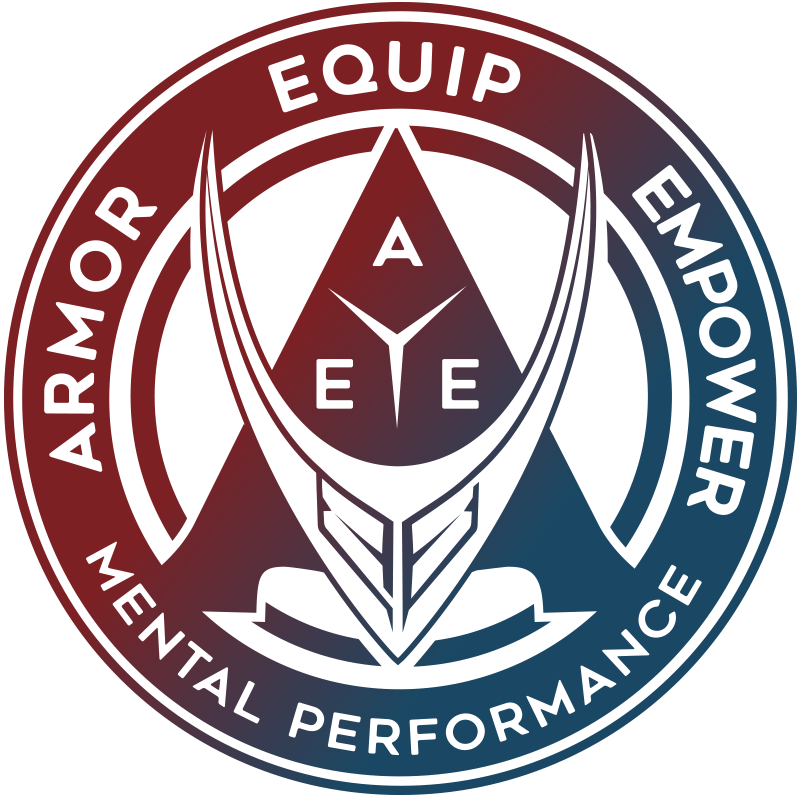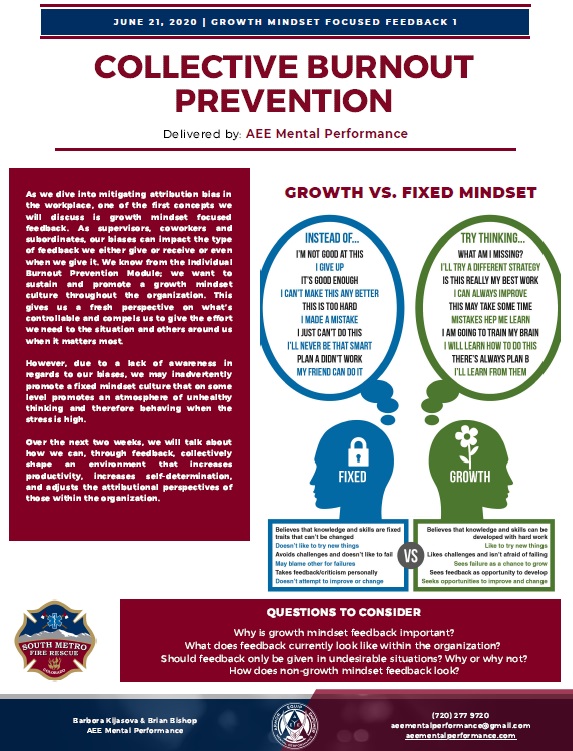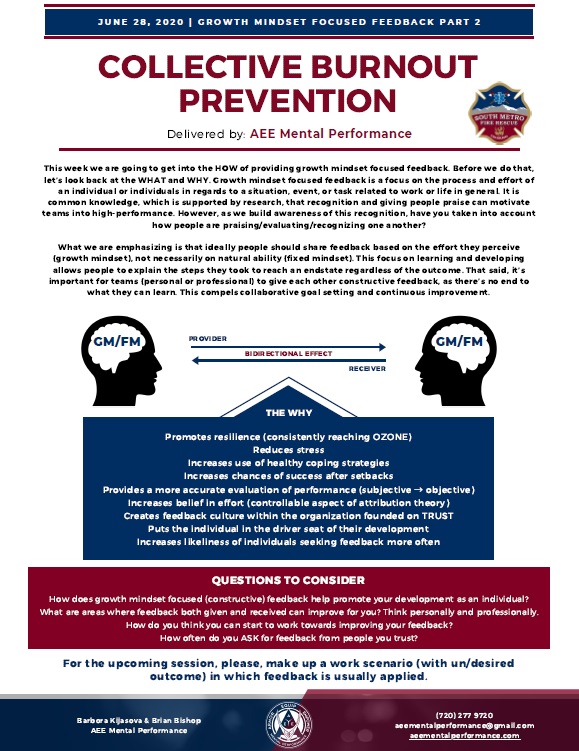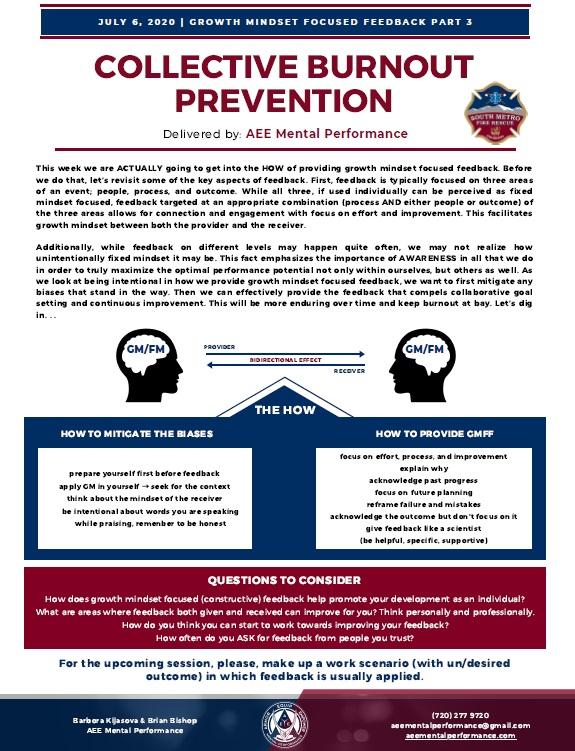lesson 2:
growth mindset
focused feedback
Downloadable handouts:
Fixed mindset vs. Growth mindset
There are two mindsets that have a MAJOR impact on our ability to learn, grow, and achieve our goals. Fixed Mindset and Growth Mindset.
Fixed mindset
Fixed mindset is the BELIEF that our skills are set, that we have what we have, and that we cannot change them. That we don’t really have the capacity to change and learn. SKILLS ARE BORN.
Growth mindset
Growth mindset is the BELIEF that we are in control of our skills. That skills are things that can be developed and improved. That we have the capacity to learn and grow. SKILLS ARE BUILT.
More on mindset in Individual Burnout Prevention resource room.
Why does mindset matter in burnout prevention?
We encourage you to review the Individual Burnout Prevention resource room to get more information. You can also check this video on mindset and review how it defines our perception of effort, mistakes, challenges, and FEEDBACK.
Mindset affects how we receive and provide feedback
Mindset affects how we receive feedback:
- With the growth mindset, we more likely receive and welcome feedback from others
Mindset affects how we provide feedback:
- Applying growth mindset mitigates fundamental attribution error because it pushes us to seek for the context behind someone’s behavior
- i.e. when a coworker has low energy and low motivation, with a growth mindset I look further (situational factors) instead of assuming that he/she is just lazy (dispositional factors)
Feedback affects mindset
Feedback we provide has a significant impact on others’ mindset.
When someone has a fixed mindset and is getting/experiences burnout (which both together happen fairly often), we have the ability to help them shift their mindset towards the growth mindset. In other words, by providing a growth mindset focused feedback, we have the ability to change other’s perspectives that help keep the burnout at bay. Higher persistence, focus on controllable within a situation and approaching it adequately, healthier coping, optimal motivation.
Impact of growth mindset focused feedback on others
When we provide Growth Mindset Focused Feedback, we help others:
- obtain higher persistence during setbacks, be more resilient
- focus on controllable within an undesired situation
- approach undesired situations adequately
- apply healthier (adaptive) coping strategies (refer to IBP)
- reach optimal motivation
- maintain solid confidence even after failure
- use mistakes or undesired situations as opportunities to process, learn, adjust, improve
the why
Feedback is typically focused on people/process/outcome. Feedback directed at the person or outcome is fixed mindset. Growth mindset focused feedback emphasizing the process is intentional. This is important because unintentionally, we tend provide fixed mindset focused feedback that unintentionally keeps our team in a fixed mindset before, during, or after performance. As we discussed in growth mindset focused feedback part 1, this impacts our susceptibility to burnout, due to how we respond to success and failures.
Growth Mindset also mitigates the attribution biases that impact how and when we provide feedback or receive feedback as it compels us to search for the context and not assume we know or can explain other’s behaviors based on what we see. Remember, WHAT WE SEE MAY NOT BE REALITY!
Why is learning how to provide GMFF important?
Before we dive into how, let’s provide some rough numbers on feedback within life in general:
- 76% of feedback is fixed mindset focused feedback which can be destructive over time
- 38% of feedback is focused on the person (abilities, talent)
- 38% of feedback is focused on the outcome
- 24% of feedback is focused on the process (EFFORT)
- Nearly HALF of the feedback that people hear comes from their peers
- 47% of feedback comes from coworkers, friends, peers
- 37% comes from teachers, bosses, coaches
- 16% comes from parents/guardians
*source: https://trainugly.com/portfolio/peerfeedback/
Below are a couple videos that explore the differences in growth and fixed mindset focused feedback. These two videos are mostly talking about praise, which is a type of feedback, however the concepts can be applied across the board for feedback amongst coworkers. Are you providing feedback on the effort or the ability?
As we talk about how growth mindset focused feedback promotes a growth mindset culture, a few things start to happen. Within this notion of providing growth mindset focused feedback, there is an element of trust, leadership, and communication. We will get deeper into those with the communication lessons, but for now, we will talk about how as trust develops between co-workers, they tend to seek feedback more often from one another.
Additionally, the promotion of a growth mindset culture increases resilience, reduces stress, allows for a more accurate evaluation of performance, increases the probability of the individual selecting an adaptive coping strategy, increases belief in effort, increases level of autonomy which in turn increases self-determination, and increases the probability of turning setbacks into success.
When you are growing and learning you are not burning out!
Now, lets dive a little bit deeper into what biologically is happening withing the body as we help each other promote a growth mindset approach to situations, setbacks and successes. Growing and learning activates the ventral vagus nerves (parasympathetic nervous system) within the autonomic nervous system. This area is responsible for connecting and engaging which helps promote calmness, playfulness, fulfillment in one’s own life. This area is also activated in infants and toddlers as they engage with parents.
As we grow older, the effects of this part of our nervous system is suppressed as we experience threats and challenges, stress, and pressure. Our response to these activate our sympathetic nervous system which entails heightened states of arousal that prepare the individual to respond. Responding/performing is typically where we utilize the fixed mindset as we discussed in growth mindset during IBP. The goal post performance is to help move the individual back into the connected and engaged state through learning and growing about yourself and what works as well as in regards to your’s or other’s performance. This is done by intentional implementation of growth mindset focused feedback.
the how
Barriers to growth mindset focused feedback
Jumping straight into Growth Mindset Focused Feedback is not as easy as it sounds. There could be various factors that stand in the way. Let’s take a look at what some of those may be to increase our awareness of what we may have to overcome as we make growth mindset focused feedback a new habit.
Barriers:
- Natural habit to unintentionally provide fixed mindset focused feedback
- Unconscious bias (attribution bias as we mentioned)
- Culture (within the workplace and things we have been taught through professional development)
- Upbringing (how we were raised is what we know)
- Lack of effort and/or time to add additional explanations
- It is uncomfortable (not wanting to be vulnerable
- Ineffective communication (see on the next page)
Think about when these barriers occur for you!
How to provide growth mindset focused feedback
Steps on how to mitigate biases:
- Apply growth mindset in yourself → Seek the context so that you approach the feedback objectively and mitigate the biases
- Recognize of performance changes
Accept counterfactual information - Collect holistic picture of rated individual
- Apply more deliberate and data-based decisions
- Prepare yourself first before the feedback
- Apply growth mindset within yourself – seek the context
- Cognitively frame feedback as a learning experience. Goal is teaching and learning not judging
- Think about the mindset of the receiver and help them either maintain or adopt a growth mindset
- Be intentional about the words you are speaking; specifically praise effort and improvement
- While praising; remember to be honest about the performance as well
Finally, HOW to provide Growth Mindset Focused Feedback:
- Focus on the effort, process and improvement (not people or outcomes → FM feedback)
- Acknowledge past progress
- Focus on future planning
- Reframe failure, reframe mistakes (into opportunity to learn)
- Change perspective on setbacks
- Explain why
- Acknowledge the outcome, but don’t focus on the outcome
- Give feedback like a scientist – be helpful, specific, and supportive



